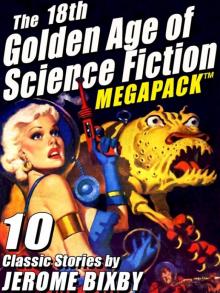- Home
- Jerome Bixby
The 18th Golden Age of Science Fiction MEGAPACK ™: Jerome Bixby Page 9
The 18th Golden Age of Science Fiction MEGAPACK ™: Jerome Bixby Read online
Page 9
"Absolutely."
"He just thinks his gun into his hand?"
"Exactly."
"Faster than anyone could ever draw it?"
"Inconceivably faster. The time element is almost non-existent."
I got up, feeling worse than I'd ever felt in my life. "Come on," I said. "Let's see what happens."
As if there was any doubt about what was bound to happen.
We stepped out onto the porch and over to the rail. Behind us, I heard Menner come out too. I looked over my shoulder. He'd wrapped a towel around his head. Blood was leaking through it. He was looking at Buck, hating him clear through.
* * * *
The street was deserted except for Buck standing about twenty feet away, and, at the far end, Sheriff Ben Randolph coming slowly toward him, putting one foot ahead of the other in the dust.
A few men were standing on porches, pressed back against the walls, mostly near doors. Nobody was sitting now—they were ready to groundhog if lead started flying wild.
"God damn it," I said in a low, savage voice. "Ben's too good a man to get kilt this way. By a punk kid with some crazy psychowhosis way of handling a gun."
I felt the professor's level eyes on me, and turned to look at him.
"Why," he said, "doesn't a group of you get together and face him down? Ten guns against his one. He'd have to surrender."
"No, he wouldn't," I said. "That ain't the way it works. He'd just dare any of us to be the first to try and stop him—and none of us would take him up on it. A group like that don't mean anything—it'd be each man against Buck Tarrant, and none of us good enough."
"I see," the professor said softly.
"God...." I clenched my fists so hard they hurt. "I wish we could think his gun right back into the holster or something!"
Ben and Buck were about forty feet apart now. Ben was coming on steadily, his hand over his gunbutt. He was a good man with a gun, Ben—nobody around these parts had dared tackle him for a long time. But he was out-classed now, and he knew it. I guess he was just hoping that Buck's first shot or two wouldn't kill him, and that he could place a good one himself before Buck let loose any more.
But Buck was a damn good shot. He just wouldn't miss.
The professor was staring at Buck with a strange look in his eyes.
"He should be stopped," he said.
"Stop him, then," I said sourly.
"After all," he mused, "if the ability to perform telekinesis lies dormant in all of us, and is released by strong faith and desire to accomplish something that can be accomplished only by that means—then our desire to stop him might be able to counter his desire to—"
"Damn you and your big words," I said bitterly.
"It was your idea," the professor said, still looking at Buck. "What you said about thinking his gun back into its holster—after all, we are two to his one—"
I turned around and stared at him, really hearing him for the first time. "Yeah, that's right—I said that! My God ... do you think we could do it?"
"We can try," he said. "We know it can be done, and evidently that is nine-tenths of the battle. He can do it, so we should be able to. We must want him not to more than he wants to."
* * * *
"Lord," I said, "I want him not to, all right...."
Ben and Buck were about twenty feet apart now, and Ben stopped.
His voice was tired when he said, "Any time, Buck."
"You're a hell of a sheriff," Buck sneered. "You're a no-good bastard."
"Cuss me out," Ben said. "Don't hurt me none. I'll be ready when you start talking with guns."
"I'm ready now, beanpole," Buck grinned. "You draw first, huh?"
"Think of his gun!" the professor said in a fierce whisper. "Try to grab it with your mind—break his aim—pull it away from him—you know it can be done! Think, think—"
Ben Randolph had never in anyone's knowledge drawn first against a man. But now he did, and I guess nobody could blame him.
He slapped leather, his face already dead—and Buck's Peacemaker was in his hand—
And me and the professor were standing like statues on the porch of the Once Again, thinking at that gun, glaring at it, fists clenched, our breath rasping in our throats.
The gun appeared in Buck's hand, and wobbled just as he slipped hammer. The bullet sprayed dust at Ben's feet.
Ben's gun was halfway out.
Buck's gunbarrel pointed down at the ground, and he was trying to lift it so hard his hand got white. He drove a bullet into the dust at his own feet, and started to whine.
Ben's gun was up and aiming.
Buck shot himself in the foot.
Then Ben shot him once in the right elbow, once in the right shoulder. Buck screamed and dropped his gun and threw out his arms, and Ben, who was a thorough man, put a bullet through his right hand, and another one on top of it.
Buck sat in the dust and flapped blood all around, and bawled when we came to get him.
* * * *
The professor and I told Ben Randolph what had happened, and nobody else. I think he believed us.
Buck spent two weeks in the town jail, and then a year in the state pen for pulling on Randolph, and nobody's seen him now for six years. Don't know what happened to him, or care much. I reckon he's working as a cowhand someplace—anyway, he sends his mother money now and then, so he must have tamed down some and growed up some too.
While he was in the town jail, the professor talked to him a lot—the professor delayed his trip just to do it.
One night he told me, "Tarrant can't do anything like that again. Not at all, even with his left hand. The gunfight destroyed his faith in his ability to do it—or most of it, anyway. And I finished the job, I guess, asking all my questions. I guess you can't think too much about that sort of thing."
The professor went on to San Francisco, where he's doing some interesting experiments. Or trying to. Because he has the memory of what happened that day—but, like Buck Tarrant, not the ability to do anything like that any more. He wrote me a couple times, and it seems that ever since that time he's been absolutely unable to do any telekinesis. He's tried a thousand times and can't even move a feather.
So he figures it was really me alone who saved Ben's life and stopped Buck in his tracks.
I wonder. Maybe the professor just knows too much not to be some skeptical, even with what he saw. Maybe the way he looks at things and tries to find reasons for them gets in the way of his faith.
Anyway, he wants me to come to San Francisco and get experimented on. Maybe someday I will. Might be fun, if I can find time off from my job.
I got a lot of faith, you see. What I see, I believe. And when Ben retired last year, I took over his job as sheriff—because I'm the fastest man with a gun in these parts. Or, actually, in the world. Probably if I wasn't the peaceable type, I'd be famous or something.
UNDERESTIMATION
Written with Algis Budrys. Originally published in Rocket Stories, Sept. 1953, under the pseudonym “Alger Rome."
RAM—E/M 3 lifted gravs from Flushing Spaceport and headed Marsward. When the last jet cut out, the girl staggered into the control room. The sound of her unsteady footsteps, together with her sick moan, spun Gerris back from the manual control board.
“No!”
“’Fraid so,” the girl said. She wiped a smear of blood away from her nostrils and grinned at him.
Gerris cursed under his breath. “I suppose you know the law on stowaways?” he said, grimacing.
“Uh-huh. So either push me out the airlock or turn around and land me.” Despite the fact that her face was gray and her knees were obviously trembling, the grin widened into a challenge.
Gerris’s expression had nothing in it of either laughter or response. His mouth set itself in a narrow line.
“Obviously, you don’t know just exactly what kind of a fix you’re in,” he said. “Do you know where this ship’s headed?”
“H
aven’t got the faintest idea, Handsome,” the girl said, leaning against a bulkhead. “I don’t care much, either. Anything’s better than the House of Correction. I wasn’t doing any picking and choosing when I hit the field last night, believe me.”
Gerris frowned. “This ship is officially designated as ‘Robot and/ or Manual—Earth/Mars Vessel Number 3.’ It’s intended for robot operation at least ninety percent of the time. She’s not equipped with full manual controls. All I can do is duck away from a meteor, or make a few other minor course changes. What’s more, there’s no airlock. I can’t turn around, and I can’t push you out without wasting a shipful of air. Does that make you happy?”
“Sure does.”
For the first time, Gerris smiled—a tough, ironical twitch of his lips. “How much do you know about the setup on Mars?”
“Not a damn thing. Got a cigarette?”
“You have a talent for bypassing the significant and proceeding forcefully to the irrelevant, haven’t you?” Gerris threw her his pack.
“You wouldn’t say you’d ever seen me clean out a till,” the girl replied, flashing the same challenging grin.
In spite of himself, Gerris laughed. The girl broke into a laugh of her own, throwing her head back and parting her lips away from her teeth. Something about the self-confident way in which her hands rode her hips called to a yearning that should have been obscured by the thought of a wife and two children waiting in Marsdome. Perhaps because of this, Gerris’s laugh became a stern frown.
“Listen—”
“Marilyn.”
“Listen, Marilyn, you don’t seem to understand what you’ve gotten into.”
“Look, Handsome, I don’t care what I’ve gotten into. What counts is what I’m out of, and that I’m getting farther away from Earth every minute.” The wild, laughing light that never left her eyes completely, brightened again. “What’s more, on a ship with a very cute pilot. The situation bids fair to be one of the most pleasant in months.” She did not change her position against the bulkhead, but the effect was the same as if she moved over to him and run her hand down his cheek.
He coughed and shifted his weight. “I’ll have you know I’m married,” he said, conscious of his sham dignity. “Not only that, I’ve got two children. Moreover, I’m a meteorologist, and I’ve been one long enough to sublimate any wild urges into involved monographs on altocirrus cloud formations.”
Marilyn raised an eyebrow. “Maybe,” she said. “On the other hand, you just might be getting bored with it all.” She studied his face. “In fact—”
She moved up and kissed him with her mouth open and her arms tight. Gerris found himself looking at her short, copper-colored hair with surprisingly limpid eyes.
Marilyn moved her head until it rested against his shoulder. “Altocirrus clouds, huh?” she murmured. “Put that in your monograph and publish it.”
Gerris had not been kissed in that way for some years. He discovered that a violent reaction was taking place within him. He turned back to the controls with an abrupt twist of his body.
“Let’s cut that out right now,” he said harshly.
“Anything you say, Handsome,” Marilyn said, her tone of voice implying precisely the opposite. She blew smoke against the back of his head. “What’s your name, lover?” she asked.
“James Gerris.” He pushed his face against the binocular periscope eyepiece. His fingers were shaking.
“That James Gerris, huh? You are weather-controlling Mars, or something, aren’t you?”
“I’m drawing up a tentative plan for an experimental attempt on a local scale, if that’s what you mean, yes.”
“Well, I am in distinguished company.”
“You’re going to be in a lot more of it. In fact, you’re going to be extremely, close to it.” He was as much intrigued by the thought as he was apprehensive.
“How do you mean?”
“Just what do you know about conditions on Mars?” he asked.
“Damn little. In fact, all I know is that you people on the research staff live in a pressurized dome, and that the twenty adults and few-odd kids of you are all the life there is on Mars.”
Gerris twitched his mouth. “It doesn’t sound so bad, when you say it fast, that way. Actually, if you had any idea of what it’s like to live in a dome, you’d know how appalling it was.”
“How so?”
“The entire operation is strictly run on a shoestring. U of K’s a rich school, but even so, it’s terrifically expensive to maintain the dome. Do you have any idea of what it’s costing, just to keep an atmosphere in this ship, heat it, air-condition it, stock it with food, and run a course with no kinks in it a human being couldn’t stand, at an acceleration below the human critical level? It’s roughly double what robot operation costs. It takes three months to set up authorization for a human passenger.
“And that’s just an example. The dome itself is about as far removed from a luxury hotel as it can get. It’s split up into two lobes, with the pile in the center. One lobe is crammed full of labs. The other one has ten cubicles in it. Each couple, and their children if they have any, lives in one cubicle. Space is so limited that the larger families sleep in shifts.”
He turned around to see Marilyn’s reaction. She was displaying no sign of any emotion, or understanding.
“That’ doesn’t leave me much room, does it?” she said casually. Gerris smiled grimly. “It leaves you no room. Every inch of space is taken up. We live like pigeons in a bank of coops.”
She shrugged her shoulders. “I’ll sleep in the ship.”
“No, you won’t. The supplies’ll be unloaded the minute we land, our samples and reports will be stowed aboard, and the ship reset to automatic control. She’ll take off again in about six hours.”
“Rig me a shelter somewhere, then. I don’t care.”
“Rig you a shelter? Out of what—cornflakes boxes? We haven’t got any structural materials to spare, and the wind-storms will knock anything else flat. Besides, how’d you insulate it? Or are you planning to requisition some of our oxygen to keep a fire going at night? To say nothing of keeping a mask on all the time.”
This time, it seemed to penetrate.
“There must be someplace for me!” Marilyn said petulantly, grinding her cigarette out on the deck with an angry twist of her foot.
“Sure. Right on top of the pile.”
She pouted at him.
Gerris sighed. “Honey, you got yourself into this. All the vamping in the world isn’t going to change the fact that there is simply no room for you.” He shook his head in frustration. “Don’t worry about it, though. Once we land, twenty highly trained minds are going to have to drop everything else and devote themselves entirely to solving your problem for you.”
Marilyn’s expression brightened, and she raised her hand to push back a strand of hair.
“Sex appeal has nothing to do with it,” Gerris said.
“No?”
“No. It just so happens that we’d have to do the same even if you were a hundred and fifty years old and were on your fifth set of false teeth.” He cracked his knuckles savagely. “You see, woman, we can’t send you back for three months, at the soonest.”
“You can’t send me back, period. If you think you can, just try it.” Her blue eyes sparkled angrily.
“When we can, we will, even if it means all of us have to hold you down and strap you in. But before we do, we’ve got to get authorization to run a human-amenable course and passage. I told you that was a tough proposition.”
“Fine. The longer it takes, the better.”
“God! No wonder you landed in a reformatory! What a brain—or rather, lack of one!” Gerris clenched a fist and sighed in frustrated anger. “Can’t you understand the basic difficulty? There simply isn’t any place to put you! You can’t stay on the ship, you can’t stay in the dome, you can’t stay on the surface of Mars, and you can’t return to Earth.” He made an angry sound i
n his throat. “I don’t know what we’re going to do with you.”
Marilyn had had time to recover her shell of bravado. “I know,” she said.
“What?”
“I’ll marry one of the men.”
Gerris stared at her incredulously. Hadn’t she understood, when he described life in the dome? Probably not, he decided.
“You’ll have to arrange a divorce from his wife, first,” he said.
That one staggered the girl for only a minute. She cocked an eyebrow and grinned maliciously. “I might just do that.”
“It still wouldn’t solve the problem of finding room for you.”
“Hell, it wouldn’t. You’d have to figure out what to do with his ex-wife, though.” She smiled broadly, and looked Gerris over “I might consider raising the kids myself,” she said.
* * * *
Gerris spent a restless eight hours in the control chair while Marilyn slept in the single bunk. He would drop off to sleep for a few minutes, then wake up again, his brain churning.
Life on Mars had been hard, and presented a constant battle for survival. Working under those conditions was almost inconceivably difficult—far different from calculations and deductions arrived at in the sheltered quiet of an Earthside lab. Recaps and analyses of preliminary data, too, were more easily accomplished in a hidden office than in a cubicle apartment with two young children to furnish distraction.
All that, however, was in the line of duty. His skill and training were designed to overcome just such obstacles.
The problem of Marilyn was something else again. The girl was attractive—he stirred uneasily in the chair—and her impact on the male members of the dome staff would have behind it the combined shock of a new female face, after two to four years of contact with no strange women, and the friction which would undoubtedly be set off immediately between bemused husbands and jealous wives. Particularly if Marilyn actually did make room for herself by what, admittedly, was the best method he could think of, from a practical standpoint. If the girl did set her cap for one of the men... He felt a quiver of dread.
He banged his hand on the chair’s arm in frustration. No matter what happened, it was obvious that the staff would be completely disrupted as any sort of an effective research unit.

 The Draw
The Draw The Holes Around Mars
The Holes Around Mars The Slizzers
The Slizzers Zen
Zen The 18th Golden Age of Science Fiction MEGAPACK ™: Jerome Bixby
The 18th Golden Age of Science Fiction MEGAPACK ™: Jerome Bixby